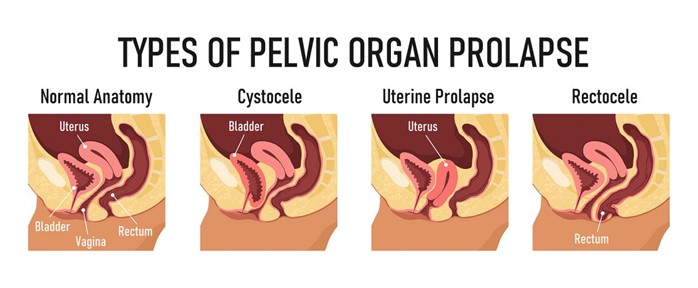A nurse is reading a journal article about the care of a woman with pelvic organ prolapse. The nurse would expect to find information related to which disorder? Select all that apply.
Fecal incontinence
Rectocele
Urinary incontinence
Cystocele
Enterocele
Correct Answer : B,C,D,E
Choice A: Fecal incontinence is not the correct answer because it is not a disorder of pelvic organ prolapse. Fecal incontinence is a condition that causes the loss of bowel control, resulting in involuntary leakage of stool or gas. It can be caused by various factors such as nerve damage, muscle weakness, or diarrhea. It is not related to the displacement or descent of pelvic organs.
Choice B: Rectocele is the correct answer because it is a disorder of pelvic organ prolapse. Rectocele is a condition that occurs when the rectum bulges or sags into the vagina, creating a pouch or hernia. It can cause symptoms such as constipation, difficulty with bowel movements, or a feeling of pressure or fullness in the vagina. It is caused by the weakening or stretching of the pelvic floor muscles and connective tissue that support the rectum and vagina.
Choice C: Urinary incontinence is the correct answer because it is a disorder of pelvic organ prolapse. Urinary incontinence is a condition that causes the loss of bladder control, resulting in involuntary leakage of urine or urge to urinate. It can be caused by various factors such as stress, infection, or medication. It is also related to the displacement or descent of pelvic organs, such as the bladder or urethra, which can affect the function and closure of the urinary sphincter.
Choice D: Cystocele is the correct answer because it is a disorder of pelvic organ prolapse. Cystocele is a condition that occurs when the bladder protrudes or drops into the vagina, creating a pouch or hernia. It can cause symptoms such as urinary frequency, urgency, or retention, or a feeling of pressure or fullness in the vagina. It is caused by the weakening or stretching of the pelvic floor muscles and connective tissue that support the bladder and vagina.
Choice E: Enterocele is the correct answer because it is a disorder of pelvic organ prolapse. Enterocele is a condition that occurs when the small intestine bulges or descends into the vagina, creating a pouch or hernia. It can cause symptoms such as lower back pain, pelvic pressure, or difficulty with bowel movements. It is caused by the weakening or stretching of the pelvic floor muscles and connective tissue that support the small intestine and vagina.

Nursing Test Bank
Naxlex Comprehensive Predictor Exams
Related Questions
Correct Answer is A
Explanation
Choice A: "You seem scared to talk to your parents." This response is appropriate because it reflects the client's feelings and shows empathy and respect. It also opens the door for further communication and support from the nurse.
Choice B: "If you want me to, I can tell your parents for you." This response is not appropriate because it does not respect the client's autonomy and confidentiality. It also may make the client feel more anxious or helpless and may damage the trust between the client and the nurse.
Choice C: "Your parents will have to be told why you are being admitted." This response is not appropriate because it does not address the client's feelings or concerns. It also may sound harsh or threatening to the client, who may fear the consequences of telling her parents.
Choice D: "Give your parents a chance; they'll understand." This response is not appropriate because it does not acknowledge the client's feelings or concerns. It also may sound unrealistic or insensitive to the client, who may have valid reasons to doubt her parents' reaction or acceptance.
Correct Answer is B
Explanation
Choice A: "Don't worry, I will be with you during the exam." This response is not appropriate because it does not address the client's feelings or concerns. It also may sound dismissive or patronizing to the client, who may have valid reasons to be nervous.
Choice B: "What part of the exam makes you most nervous?" This response is appropriate because it shows empathy and interest in the client's perspective. It also invites the client to express her fears or questions and allows the nurse to provide information and reassurance.
Choice C: "All you need to do is relax." This response is not appropriate because it does not acknowledge the client's feelings or concerns. It also may sound unrealistic or insensitive to the client, who may find it hard to relax in a stressful situation.
Choice D: "A pelvic exam is required if you want birth control pills." This response is not appropriate because it does not address the client's feelings or concerns. It also may sound coercive or threatening to the client, who may feel pressured or intimidated by the requirement.
Whether you are a student looking to ace your exams or a practicing nurse seeking to enhance your expertise , our nursing education contents will empower you with the confidence and competence to make a difference in the lives of patients and become a respected leader in the healthcare field.
Visit Naxlex, invest in your future and unlock endless possibilities with our unparalleled nursing education contents today
Report Wrong Answer on the Current Question
Do you disagree with the answer? If yes, what is your expected answer? Explain.
Kindly be descriptive with the issue you are facing.
